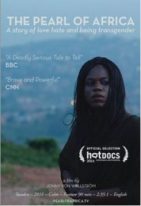 The Pearl of Africa. Dir. Jonny von Wallström. Rough Studios. 2016. 31 min.
The Pearl of Africa. Dir. Jonny von Wallström. Rough Studios. 2016. 31 min.
The Pearl of Africa, a compelling web series directed by Jonny von Wallström, brings to mind the iconic quote from Marlon Riggs’s seminal 1989 film Tongues Untied: “Black men loving Black men is a revolutionary act.” The audacity of merely doing what comes naturally can speak volumes and move mountains, but can still expose you to very real dangers. The protagonist of this series, Cleopatra (Cleo) Kambugu, is a trans woman doing her best to live her life in Uganda, a country whose government does not believe she has the right to exist. She is less interested in speechifying and preaching than she is in trying to function in her day to day life and ensuring that others like her have the same opportunity. She is a woman of charm and determination, full of quiet revolution.
A documentary about Cleo’s day to day life would have been enlightening enough, but her life is thrown into turmoil when a Ugandan tabloid outs her and many others in the Ugandan LGBT community. Many of those outed are assaulted and threatened with death and violence, prompting Cleo and others to spend much of the film living under self-imposed house arrest. This appalling turn of events has a pronounced effect on the tone of the series. What begins as an exploration of Cleo’s life, full of sweeping shots of Uganda’s beautiful landscape and vibrant depictions of her social life with her boyfriend and other friends, becomes a claustrophobic portrait of isolation and alienation. The human costs of homophobia and transphobia are laid bare.
Unfortunately, part of what makes this presentation so accessible is what ends up being its biggest liability. In its web-series format, it is easily digestible and, in its documentary form, it is very manageable in length. Yet Cleo and her boyfriend are so compelling and there are so many issues to explore. Because of its short runtime, it doesn’t quite feel fleshed out and the principal subjects aren’t given the deep exploration they deserve. As an example, a tenuous corollary is drawn between the American civil rights movement and what Cleo hopes for the future of Uganda. Disappointingly, this connection is addressed rather hastily and the nuances of the comparison are not touched upon deeply. What one wishes for is a feature-length documentary about Cleo specifically and Uganda broadly to allow these issues to be explored in detail and to allow Cleo’s voice to be heard on an even more wide range of issues. The Pearl of Africa, perhaps, is most effective as a primer and conversation starter.
This series, soon to be combined and released as a documentary film, is still an essential addition to the steadily growing canon of films dealing with trans issues around the world. With the recent successes of productions like Amazon’s Transparent and Sean Baker’s Tangerine, a sense of these issues and how they impact lives have been slowly growing in the mainstream consciousness, at least in the United States. What often remains invisible are the experiences of those all around the world who also face life-threatening discrimination. Library programming based around this production could truly change perceptions of LGBT experiences around the world. The Pearl of Africa serves as both an invitation to engage with other nations and cultures, as well as a subtle call to action for socially conscious citizens everywhere.
Michael Mungin
Psychology Librarian, James Madison University
